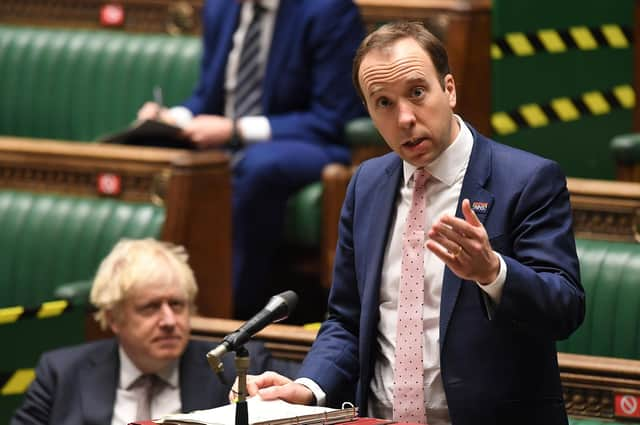The answer to Matt Hancock's question about why British people work when sick is simple – Joyce McMillan


“We are peculiarly unusual and outliers in soldiering on and still going to work,” he said, “and it kind of being the culture that 'as long as you can get out of bed you still should get into work’. That should change. Why in Britain do we think it's acceptable to go into work if you have flu symptoms or a runny nose, thus making your colleagues ill?”
All of which would amount to a reasonable enough question, were it not that the answer to it should be staring Matt Hancock, and any other UK politician, in the face.
Advertisement
Hide AdAdvertisement
Hide AdPeople in Britain go to work when they are unwell mainly because they cannot afford not to; and the reasons they cannot afford it are directly related to changes in the UK labour market consciously made and encouraged by Matt Hancock’s party and its ideological allies over a period of 40 years.
In 2016, for example, a European Social Policy Network report on sick leave and sick pay across the EU found that the typical “replacement level” of statutory sick pay in the UK was barely 20 per cent of earnings, lower than every other EU country except Malta, and less than a third of the norm across western Europe – a shocking comparison that has improved only slightly following recent Covid adjustments.
Nor is poor statutory sick pay the only problem facing British workers who are unwell. Over the last decade, huge numbers of people facing unemployment have been encouraged to get off the books, and out of the statistics, by re-framing themselves as self-employed entrepreneurs, thereby forfeiting entitlement to most of the benefits normally paid to employees; their average earnings are very low, their job security nil, and their real social safety net almost non-existent.
Many other workers are employed under zero-hours contracts, and in normal times simply are not paid when they do not work, regardless of the reason.
All of these practices have been promoted and encouraged by Conservative governments as part of the development of what they proudly trumpet as a more “flexible” labour market than in many other European countries. And of course, the journey towards this more deregulated labour market began in the 1980s, with Margaret Thatcher’s determination to break trade unions – the only organisations with a substantial historic impact in improving wages and working conditions – as a major force in British society; so that today, despite vast increases in GDP, any social observer is bound to note the number of families now suffering from “in-work poverty”, and the declining ability of a worker earning an average single wage to support the reasonable living costs of a whole family, as was the norm between the 1950s and the 1970s.
And what is significant here is the question of why the Conservative party and its leaders so often seem to be unaware of, or perhaps in denial about, the meaning and impact of the party’s own policies in this area.
Following this week’s incoherent and reactionary spending review, complete with a freeze on public sector pay and a massive boost in military spending, the Chancellor, Rishi Sunak, is so conflicted that he cannot even bring himself to admit that he is imposing a new round of austerity on a country that has already been groaning under that cosh for the past decade; and the party’s current leader Boris Johnson is so adept at being all things to all men (and women) that his shape-shifting qualities have become an international byword.
The mood of ideological confusion and denial around the current Tory leadership is so marked, indeed, that it almost makes one nostalgic for the age of Margaret Thatcher, which – as it happens – ended 30 years ago this week.
Advertisement
Hide AdAdvertisement
Hide AdAs this month’s controversial new series of The Crown hilariously reminds us, even Lady Thatcher was not entirely free of delusions about the real meaning of her ideology; she saw herself as something of a warrior against old British establishment power, while in fact she began a long and damaging attack on those postwar provisions and institutions which, in the real world, actually helped to promote greater social mobility and equality of opportunity in Britain.
Thatcher, though, was at least crystal clear about her ideological commitment to the idea that the path to national happiness and success lay in maximising wealth and profits, with no “snivelling and drivelling” about the human cost of her policies. And in enunciating her views with such clarity and coherence, she also helped outline the space where a coherent opposition might emerge.
Today, by contrast, the Tory Party seems a different animal, home to people like the hapless Mr Hancock, who constantly pronounce themselves absolutely opposed to the inevitable consequences of their own policies.
What those people are doing in the Conservative Party at all is a question for them. The question for the rest of us, though, is how we oppose a Tory Party whose policies and attitudes still damage lives day in and day out; but which now often seems under little pressure to take responsibility for the decisions it made last week – far less for the world it has played such a key role in creating, over the last 40 years.
A message from the Editor:
Thank you for reading this article. We're more reliant on your support than ever as the shift in consumer habits brought about by coronavirus impacts our advertisers.
If you haven't already, please consider supporting our trusted, fact-checked journalism by taking out a digital subscription.
Comments
Want to join the conversation? Please or to comment on this article.